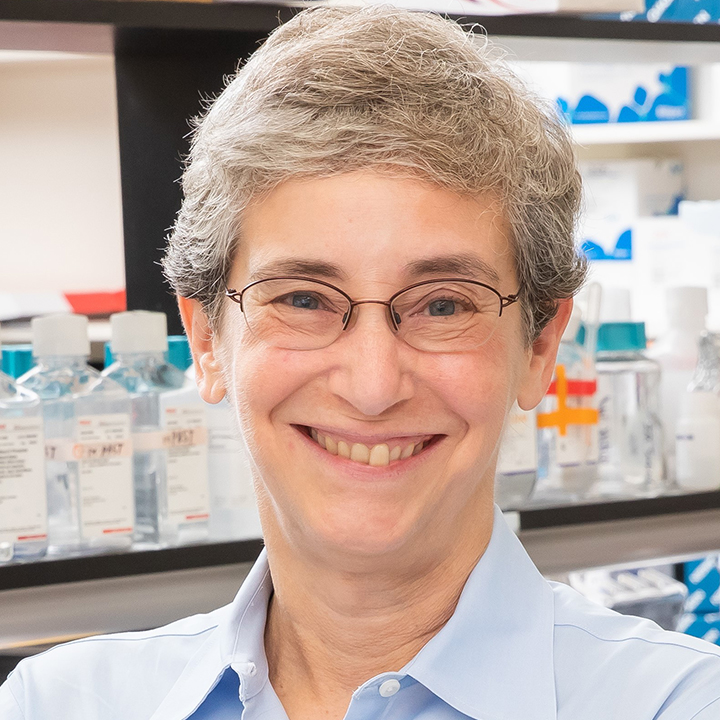Joan Conaway, Ph.D.
- Professor, Molecular Biology, Basic Science Research
- Vice Provost and Dean of Basic Science Research
- NAS member

“Dream big and you’re more than halfway there!”
Contributions to STEMM
Dr. Conaway is a molecular biologist who studies “how gene transcription is turned on and off. That is an important question, because turning on and off genes controls how an organism develops and how it responds to the environment. Many diseases develop because that control is faulty or not adequate,” she said. Dr. Conaway’s insights into disruptions in cell processes have led to advancements in understanding diseases including cancer.
Mentors and Partnerships
In 2021, Dr. Conaway joined UT Southwestern from the Stowers Institute for Medical Research in Kansas City, Missouri, where she and her husband, Ronald Conaway, Ph.D., were investigators and co-PIs of a joint research group. They met while she was a graduate student in the lab of Roger Kornberg, Ph.D., who subsequently earned the Nobel Prize in Chemistry in 2006.
“In Roger, I was exceptionally lucky to have a mentor who believed in me and was very patient and encouraging even when I hit road-bumps, saying, ‘I believe you can do it, but I will support you no matter what you decide to do.’”
Starting while she was a student and Ron was a postdoc at the DNAX Research Institute of Molecular and Cellular Biology, they “tackled the puzzle of transcription. This was the beginning of a career-long collaboration between us. For more than 35 years, Ron and I have had a tremendous partnership that enabled us to accomplish more than either of us alone would have done,” she said.
Early Influences
“My mom and dad were biochemists. My mother worked as a biochemist until I was born. As I was growing up, I went to the lab with my dad, as it seemed like a natural thing to do,” Dr. Conaway said. “From the time I was really little, my dad would come home and talk about what he was doing in his lab, and he would draw out pathways and say what he was excited about. He would take me to the lab and let me sit and play with things. That was my first peek at science, and where my interest in research began.”
“When I started college, I didn’t know if I was going into science or history and political science. I realized that science gave me an opportunity to be intellectually challenged and it became clear this was the direction I wanted to go in,” Dr. Conaway recalled. “Unsure if I wanted to go to graduate school after college, I was given an exceptional opportunity – I met Joan Steitz, Ph.D., a pioneer of molecular biology. She offered me a job as a technician. During that experience, I realized that I loved working in the lab and the research enterprise. Although there were not many women in the field, Joan was a great role model. Seeing her be a successful, strong leader made an impression.”
Embracing Change
“For a while, I’ve had a strong interest in trying to contribute not just to my own research program, but to building an environment that can be conducive to providing the very best research opportunities to colleagues,” Dr. Conaway said. She acted on this interest in 2021 “by embracing the opportunity to become Vice Provost and Dean of Basic Science Research at UT Southwestern.”
“My goal is to enable everyone to succeed. I hope to build on UT Southwestern’s tradition of research excellence and collegiality to continue to foster an environment conducive to discovery, where scientists celebrate each other’s success.”
Advice to the Next Generation
“There are always going to be challenges, and there will be times when you think, how am I going to get past this barrier? Sometimes you can’t get past all of them,” Dr. Conaway stated. In the face of hardship, she encourages the next generation to use “persistence and resilience,” with which, “you can accomplish anything you set your mind to.”
The UT Southwestern Difference
Dr. Conaway values “the opportunity to interact with faculty and to learn about the breadth of science at UT Southwestern,” in her position as Dean. “I enjoy learning a lot of new things and am excited for the potential to make connections between people and make an impact on other scientists.” After serving as a “Principal Investigator for many years, now I am on the other side and don’t have my own lab,” she said. Rather, “my job is to try to facilitate research of others.”
View Academic Profile